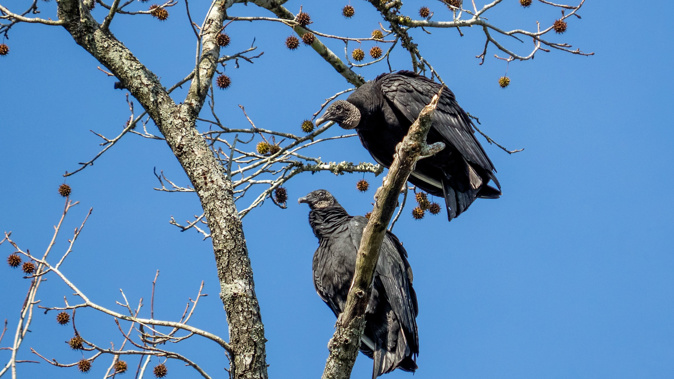
U.S. Customs and Border Protection has a problem with vultures - specifically, roughly 300 of them that are defecating and urinating all over a radio tower that the agency needs to communicate.
The excretion is coating the entire 320-foot tower in southern Texas, including the interior part that workers need to touch, according to a request for information that the agency sent to vendors. The government is seeking a "Vulture Deterrence Netting System" to be installed in August before the birds' roosting season.
The migratory birds have been making themselves comfortable on the tower in Kingsville - about 45 miles southwest of Corpus Christi - for more than six years, a CBP spokesperson told Quartz, which first reported on the vultures. CBP did not answer questions from The Washington Post on Friday.
"They will often defecate and vomit from their roost onto buildings below that house employees and equipment," said the spokesperson, whom Quartz did not name. "There are anecdotes about birds dropping prey from a height of 300 feet, creating a terrifying and dangerous situation for those concerned."
Beyond the risk of vomit and prey falling from the sky, vultures have sharp nails and beaks that can cause deep scratches. The birds also "regurgitate a reeking and corrosive vomit" that kills bacteria on their legs but also slowly destroys metal, according to the U.S. Department of Agriculture.
As acidic excretion piles up on a radio tower, the structure becomes more dangerous for the maintenance workers who have to climb it, reported AGL Media Group, a telecommunications trade publication. The birds also cough up the undigested fur and bones of their prey, and the remnants sometimes pile up on the ground, AGL reported.
Customs and Border Protection plans to clean the contaminated radio tower, remove the rust and repaint the structure before installing the netting that it hopes will deter future vultures from setting up shop. The agency's radio towers are critical to enabling officers to quickly exchange information related to border security.
Other ways of dispelling the widely disliked birds are more creative. Hanging an effigy of a vulture or a lifelike replica is often effective because birds avoid congregating near where another bird has been hurt or killed, according to AGL. Effigies should be hung head-down to appear as if they are struggling or dead.
The city of Lake Alfred, Florida, spent more than $25,000 to try to get rid of vultures on its water tower before an effigy finally drove them away, AGL reported. An energy tower and a cell tower experienced the same result.
Propane cannons and pyrotechnics can effectively dispel vultures at night, but Customs and Border Protection wrote that the deterrent it uses should involve minimal noise and visual impacts to the nearby rural area.
"In some situations, selective, lethal removal of birds may be needed to resolve damage effectively," the Agriculture Department says of vulture removal.
Killing the birds, however, is usually not an option because the Migratory Bird Treaty Act of 1918 makes it illegal. An attorney was hit with a $75,000 fine, probation and a hunting ban in 2016 for killing a protected species, AGL reported. Fines can reach up to $100,000 for individuals or $200,000 for organizations.
The Customs and Border Protection spokesperson told Quartz that the agency wants to keep the birds away while also protecting them. And for good reason: Vultures help clean up deteriorating carcasses on the ground and quell the spread of diseases and bacteria.
"CBP's Office of Information Technology has been working closely with several agencies including Fish and Wildlife, the USDA, environmental experts and the Texas State Historical Preservation Officer, to determine a good path toward a solution that will deter the vultures from roosting atop our towers while ensuring no harm to the birds," the spokesperson said. "Research has shown that netting has proven to be a viable deterrent by restricting the birds from being able to initiate roost."
The vultures did not respond to a request for comment.
Take your Radio, Podcasts and Music with you







